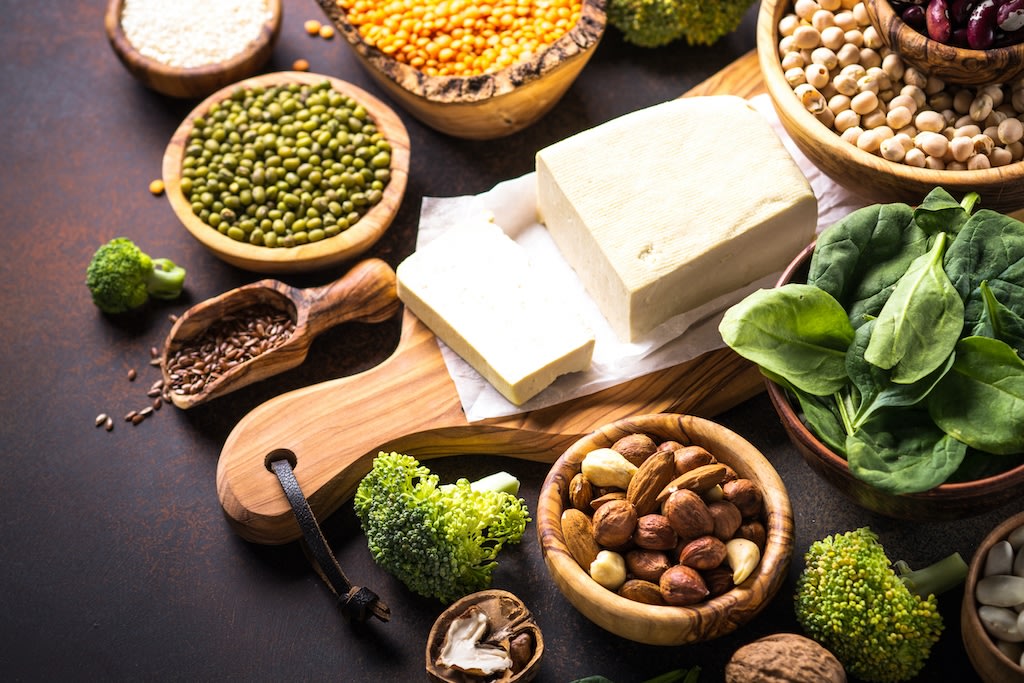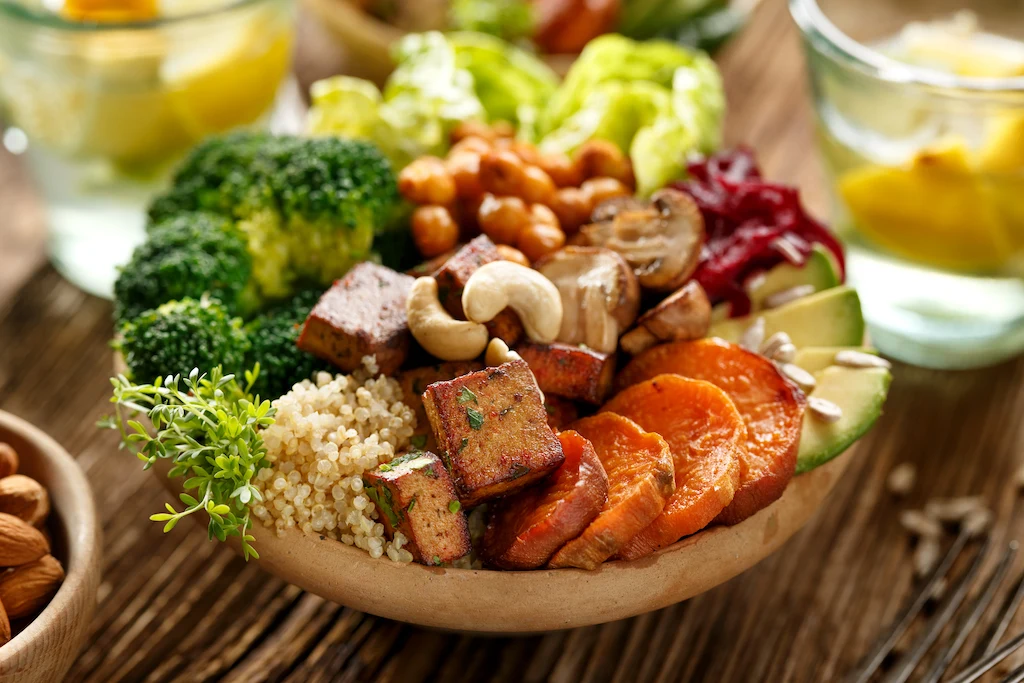12 Plant-Based Proteins To Keep You Healthy & Strong

August 14, 2020

People choose to cut back on their meat consumption or go vegan or vegetarian for so many reasons. For some it’s an ethical or environmental choice, while for others it could be about health, availability or budgeting.
Whatever your motivation, it’s entirely possible to meet your nutritional needs without animal-derived protein, but it’s important to include a range of plant-based protein sources to ensure you are eating enough of this essential macronutrient each day!
In 2016, the Academy of Nutrition and Dietetics emphasised that well-planned vegan and vegetarian diets are not only healthy and adequate for meeting your nutritional needs, but may also help prevent diseases such as heart disease, obesity, diabetes and some cancers. Let’s get started!

How much protein do you need?
The National Health and Medical Research Council (for Australia and New Zealand) recommends men consume 64 grams of protein per day (or 0.84g per kg of bodyweight) and 46 grams of protein per day for women (0.75g/kg).
According to Harvard Health in 2022, the Recommended Dietary Allowance (RDA) for protein is 0.8g/kg of body weight. They note a higher protein intake may be better for active lifestyles to maintain and build muscle and strength.
Why is protein important?
Protein is essential for building and repairing your bones, muscles, hair, skin, heart health and energy levels. It is made up of 20 amino acids (commonly referred to as the ‘building blocks’ of the body), some of which your body naturally produces, but nine of which are ‘essential’ and need to be consumed through your diet as your body doesn’t produce them.
Foods that contain all nine amino acids are referred to as ‘complete’ proteins, and are predominantly found in animal-based foods like meat and eggs.
Can you get enough protein from plant-based foods?
Yes! According to the National Health and Medical Research Council, you can meet your daily protein requirements and get all of the essential nine amino acids through plant-based protein sources alone.
That being said, a single source of plant-based protein generally won’t contain all nine essential amino acids, which is why it’s so important to have a well-planned diet that includes a variety of high protein foods if you are vegan, vegetarian or tend to avoid meat.

The benefits of plant-based sources of protein
There are many benefits of following a vegetarian or vegan diet or even reducing your meat consumption with a flexitarian diet, from the added health advantages to your environmental impact.
Weight management
According to the American Dietetic Association, vegetarians tend to have a lower body mass index. One 2016 study published in the Journal of General Internal Medicine analysed the weight loss of two groups over 18 weeks, finding the group following a vegetarian diet lost significantly more weight than the non-vegetarian group. This suggests that a plant-based diet can help with weight loss over time.
Disease prevention
In 2009, the American Dietetic Association position statement said vegetarian diets can help reduce the risk of death from ischemic heart disease according to the results of an evidence-based review.
A healthy and well-planned vegetarian diet can also lead to a reduced consumption of saturated fat and cholesterol as well as a greater consumption of fruit, vegetables, whole grains, nuts, soy, fiber, and phytochemicals which are associated with a reduced risk of chronic illness.
Reducing harmful environment impact
A 2018 study from the University of Oxford suggests that in order to reduce environmental impacts such as greenhouse gas emissions, address nutrient deficiencies and lower the number of deaths from chronic illness, plant-based diets should be encouraged.
Reduced blood pressure
Following a vegetarian diet is associated with lower blood pressure, according to a 2014 meta-analysis published in the Journal of American Medical Association Internal Medicine. This is good news, as high blood pressure can damage your arteries and lead to heart disease.

12 sources of plant-based protein
To reap the benefits of a plant-based or flexitarian diet without missing out on protein, it’s vital to know which foods to eat to hit your protein requirements and support a balanced diet.
Tofu
Tofu is a ‘complete’ protein containing all nine essential amino acids and about 12g of protein per 100g serving. For comparison, a 100g serving of beef contains 15.3g of protein. Tofu also contains nutrients such as iron, calcium, manganese, magnesium and healthy polyunsaturated fats.
Made from pressed bean curd from soybeans, tofu can be relatively bland when uncooked and unseasoned, but it’s great at absorbing the flavours of the food it’s cooked with. Try adding it to a curry, stir fry, noodle soup or marinate it first. You can even scramble tofu with different seasonings as an egg substitute. Yum!
Tempeh
Tempeh is another soy product and complete protein, similar to tofu, except the soybeans are fermented and pressed while whole.
Tempeh is firmer and has a nuttier flavour than tofu, but it also makes a great, high-protein addition to stir fries, curries and salads. Tempeh contains 18.5g of protein per 100g serving.
Chickpeas
Not only are chickpeas high in protein, they’re also high in fibre – with a serving of 100g of dried chickpeas containing 7.2g of protein and 7.6 g of dietary fibre. According to a 2009 review on the health benefits of dietary fibre,people who have a high daily fibre intake have a lower risk of developing coronary heart disease, stroke, hypertension, diabetes, obesity, and certain gastrointestinal diseases.
Lentils
Lentils are in the legume food group and contain 7.3g of protein per 100g serving. They also contain fibre, folic acid, potassium and 11.9g of carbohydrates.
Lentils are a versatile food that can be added to many cuisines – including soups, dahl, curries, and even as a replacement for mince in pasta sauces or your favourite bolognese recipe.

Black beans
Black beans (along with many other types of beans) are a great source of protein and complex carbohydrates – containing 8.9g of protein per 100g serving, and 23.7g of carbohydrates.
A 2014 review highlighted the nutritional benefits of beans and how consuming half a cup of beans (and other pulses) every day can increase your intake of key vitamins and minerals, including iron, zinc, folate, and magnesium.
Black beans are a versatile food and are commonly found in Mexican cuisine – they make a great meat replacement in chilli con carne, added to tacos, burritos, in black bean soup and this vegetable quesadilla. There are also some delicious black bean burger recipes!
Nuts
Nuts are an excellent source of protein, healthy fats and fibre for plant-based eaters, with options such as unsalted almonds containing 19.7g of protein per 100g serving.
Nuts are a good healthy snack on-the-go, or a pre-workout snack with a piece of fruit. You can add nuts or nut butter to oatmeal or desserts for an extra kick of protein and flavour.
Chia seeds
Chia seeds contain 14g of protein per 100g serving, with 34.4g of dietary fibre. They also contain high levels of antioxidants and Omega-3 fatty acids, making them a great addition to any diet.
Chia seeds expand when combined with water and can be used as an egg substitute in vegan baking, or to create chia porridge. There are plenty of chia seed recipes available that utilise this protein source.

Quinoa
Quinoa has long been a staple in South American diets, and for good reason. Quinoa is a seed (closely resembling a grain) containing 3.6g of protein and 3.4g of fibre per 100g serving. It’s also a complete protein!
Quinoa is also gluten-free, making it a great go-to for those who can’t eat wheat, and it also makes a great alternative for other grains like rice and pasta.
Spirulina
Spirulina is a powdered supplement made from algae, a seaweed-like substance that grows in rivers and lakes. When made into a powder it is very high in protein and other nutrients, with about 50g of protein per 100g. It also contains 54mg of iron, and is high in antioxidants.
Spirulina is just one dietary supplement that’s a great protein and antioxidant boost, and you’ll often find it in healthy smoothie recipes. You can also combine spirulina and protein powder in your smoothies.

Green peas
Green peas contain 4.8g of protein per 100g serving. They’re also high in magnesium, potassium and calcium, with 5.2g of dietary fibre per 100g serving.
Green peas are easy to cook, tasty, and can be added to so many recipes, including curries, soups, and as a side of greens to any meal.
Nutritional yeast
Nutritional yeast is often used as a vegan alternative to parmesan cheese, as it has a nutty, cheese-like flavour. Nutritional yeast is made from inactive yeast, and is sold as yellow flakes. It can be purchased fortified with additional vitamins and minerals, or unfortified.
Fortified nutritional yeast contains around 50g of protein per 100g serving. Most people use it as a nutritional garnish on pasta, soups, pizza or to add a cheesy flavour to sauces.
Protein powder
Although supplements should never replace whole foods within your diet, protein powder can be a quick and easy way to increase your protein intake, especially if you're vegan or vegetarian.
If you are going to use protein powder, include it as part of a healthy balanced diet. You can drink it on its own in a shake or smoothie, or add it to dishes like oatmeal and yoghurt or even use it when you’re baking.
Should you track how much protein you’re eating?
Tracking your protein can help you get an idea of how much you need to eat and how much protein different foods contain, especially if you live an active lifestyle or are trying to build muscle on a vegan or vegetarian diet.
It’s not an essential step for developing healthy eating habits, so if you aren’t going to keep an eye on your intake, be sure to make plant-based proteins a key part of every meal to help you reach your fitness goals.

A more empowered you starts with Sweat, and our editorial team is here to bring you the latest fitness tips, trainer recommendations, wellbeing news, nutritional advice, nourishing recipes and free workouts.
* Disclaimer: This blog post is not intended to replace the advice of a medical professional. The above information should not be used to diagnose, treat, or prevent any disease or medical condition. Please consult your doctor before making any changes to your diet, sleep methods, daily activity, or fitness routine. Sweat assumes no responsibility for any personal injury or damage sustained by any recommendations, opinions, or advice given in this article.
Nutrition